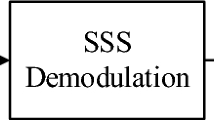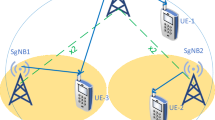Abstract
For achieving high utilization and efficient code management of the OVSF code tree in 3G WCDMA networks, several researches have extensively studied. Based on combining both the code assignment and the reassignment mechanisms, it increases obviously high utilization and reduces completely the code blocking. Nevertheless, the required rate of traffic should be powers of two of the basic rate, i.e. 1R, 2R, 4R, …, etc., which is impractical and results in wasting the system bandwidth while the required rate is not powers of two of the basic rate. Several multi-code assignment mechanisms have proposed to reduce the waste rate. Nevertheless, these methods bring two inevitable drawbacks including, high complexity of handling multiple codes, and increasing the cost of using more rake combiners at both the base stations and mobile nodes. Therefore, we propose an adaptive grouping code assignment herein to provide a single channelization code for any possible rate of traffic, even though the required rate is not powers of two of the basic rate. Based on the dynamic programming algorithm, the adaptive grouping approach forms several calls into a group. Then it allocates a subtree to the group and adaptively shares the subtree codes for these calls in the concept of time-sharing of slots during a group cycle time. Therefore, the waste rate and code blocking are thus reduced obviously while using a single rake combiner. Since the delay problem may be occurred in such a time-sharing approach, we propose two schemes of cycle interleaving methods to reduce delay. Numerical results indicate that the proposed adaptive grouping approach reduces significantly the waste rate and thus increases the system utilization. Moreover, the proposed cycle interleaving scheme reduces data delay significantly.
Similar content being viewed by others
References
R. Steele, C.-C. Lee, and P. Gould, “GSM, cdmaOne and 3G Systems”, John Wiley & Sons, 2001.
H. Holma and A. Toskala, “WCDMA for UMTS”, John Wiley & Sons, 2000.
The 3rd Generation Partnership Project (3GPP), http://www.3GPP.org
A. Viterbi, “CDMA: Principles of Spread Spectrum Communication”, Addison-Wesley, 1995.
F. Adachi, M. Sawahashi, and K. Okawa, “Tree-structured Generation of Orthogonal Spreading Codes with Different Lengths for Forward Link of DS-CDMA Mobile Radio”, Electronics Letters, Vol. 33, pp. 27–28, Jan. 1997.
Third Generation Partnership Project: Technical Specification Group Radio Access Network, Spreading and Modulation (FDD), 3GPP TS 25.213 V5.3.0, 2003.
Third Generation Partnership Project: Technical Specification Group Radio Access Network, Physical Channels and Mapping of Transport Channels onto Physical Channels (FDD), 3GPP TS 25.211 V5.3.0, 2002.
Y.-C. Tseng, C.-M. Chao, and S.-L. Wu, “Code Placement and Replacement Strategies for Wideband CDMA OVSF Code Tree Management”, Global Telecommunications Conference, Vol. 1, pp. 562–566, 2001.
T. Minn and K.-Y. Siu, “Dynamic Assignment of Orthogonal Variable-Spreading-Factor Codes in W-CDMA”, IEEE Journal on Selected Areas in Communications, Vol. 18, pp. 1429–1440, Aug. 2000.
A.C. Kam, T. Minn, and K.-Y. Siu, “Supporting Rate Guarantee and Fair Access for Bursty Data Traffic in W-CDMA”, IEEE Journal on Selected Areas in Communications, Vol. 19, pp. 2121–2130, Nov. 2001.
C.E. Fossa, Jr. and N.J. Davis IV, “A Dynamic Code Assignment Algorithm for Quality of Service in 3G Wireless Networks”, Wireless Communications and Networking Conference, Vol. 1, pp. 1–6, 2002.
C.E. Fossa, Jr. and N.J. Davis IV, “Dynamic Code Assignment Improves Channel Utilization for Bursty Traffic in Third-Generation Wireless Networks”, IEEE International Conference on Communications, Vol. 5, pp. 3061–3065, 2002.
Y.-C. Tseng and J.-P. Sheu, “Multi-OVSF Code Assignment and Reassignment in WCDMA”, Master Thesis, National Central University, 2001.
R.-G. Cheng and P. Lin, “OVSF Code Channel Assignment for IMT-2000”, IEEE Vehicular Technology Conference Proceedings, Vol. 3, pp. 2188–2192, May 2000.
Third generation partnership project: Technical specification group radio access network, Multiplexing and channel coding (FDD), 3GPP TS 25.212 V5.4.0, 2003.
Hasan Gam, “Nonblocking OVSF Codes and Enhancing Network Capacity for 3G Wireless and Beyond Systems”, Computer Communications, Vol.26, No. 17, pp. 1907–1917, Nov. 2003.
Author information
Authors and Affiliations
Corresponding author
Additional information
Ren-Hung Hwang received his M.S. and Ph.D. degrees in computer science from University of Massachusetts, Amherst, Massachusetts, USA, in 1989 and 1993, respectively. He joined the Department of Computer Science and Information Engineering, National Chung Cheng University, Chia-Yi, Taiwan, in 1993, where he is now a full Professor and the Chair of the Department of Communication Engineering. His research interests include Internet QoS, peer-to-peer infrastructure design, and 3G QoS.
Ben-Jye Chang received his M.S. degree in computer engineering from University of Massachusetts, Lowell, in 1991 and the Ph.D. degree in computer science and information engineering from National Chung-Cheng University, Taiwan, in 2001. He joined the Department of Computer Science and Information Engineering faculty at Chaoyang University of Technology, Taiwan, in 2002, where he is currently an Associate Professor. His research interests include QoS-based networks, QoS wirless networking, resource management for wireless networks and mobile cellular networks, and performance evaluation of networks.
Min-Xiou Chen received the BS degree in computer science and information engineering from Tung Hai University, Tai-Chung, Taiwan, in 1996, and the MS and PhD degrees in computer science and information engineering from National Chung Cheng University, Chia-Yi, Taiwan, in 1998 and 2005, respectively. He is now an assistant professor at the Department of Computer Science and Information Engineering, Chung Hua University, Hsin-Chu, Taiwan. His research interests include wireless communication, SIP, sensor network and resource management in WCDMA systems. He is a member of the IEEE.
Kun-Chan Tsai received the BS degree in information engineering and computer science from Feng Chia University, Taichung, Taiwan, in 2001, and the MS degree in computer science and information engineering from National Chung Cheng University, Chia-Yi, Taiwan, in 2003. His research interests include wireless communications and resource management in WCDMA systems.
Rights and permissions
About this article
Cite this article
Hwang, RH., Chang, BJ., Chen, MX. et al. An Efficient Adaptive Grouping for Single Code Assignment in WCDMA Mobile Networks. Wireless Pers Commun 39, 41–61 (2006). https://doi.org/10.1007/s11277-006-9065-2
Published:
Issue Date:
DOI: https://doi.org/10.1007/s11277-006-9065-2




